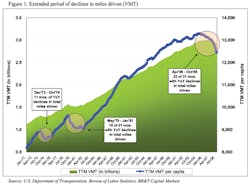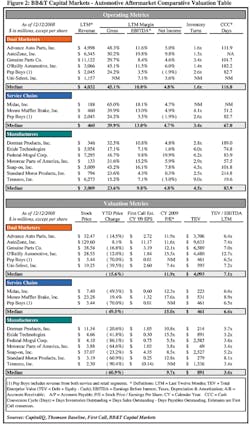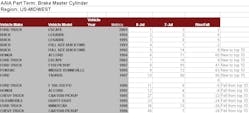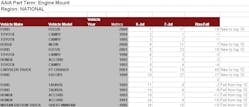Special order your way to increased aftermarket parts and service profitability.
No one in the automotive aftermarket will argue that while growth of the overall industry is strong, profit margins have decreased due to increased competition. Consumers are very price-sensitive; high return rates and the overall cost of running a brick-and-mortar shop are slowly killing off the mom-and-pop retail establishments that literally built this industry in the first place.So, where making a good profit as a retailer has gotten harder and harder, finding a profit niche is key to maintaining a successful business.
TWO WORDS: SPECIAL ORDERS
The term "special order" is a common phrase in the automotive aftermarket used to describe orders for not-in-stock products. Given the pressures on inventory control and the extent of assortments, no company can stock every part and accessory that customers might need, especially when it comes to big-ticket specialty parts. Even the best-integrated retailers/installers may need to special order at times.In the specialty and performance parts arena, treating special orders as a sales and service opportunity—instead of a hassle—can earn your business a reputation as the go-to supplier among automotive parts retailers in your area.
"I look at special orders as a service for the customer," says Ted Gotelli, owner of Gotelli Auto Supply in San Francisco. "They look to us as the source for technical advice, as a one-stop shop to get information and products. I figure if we can help them with something that's special, they'll trust us with something that isn't."Brian Keith, owner of Walter S. White Auto Parts in Birmingham, Alabama, agrees. "Everyone servicing a special order ought to make money," he says. "What it's going to come down to is the service and availability."
While special orders currently make up about 15 percent of his overall sales, Gotelli says the number of requests for special orders is quickly increasing, contributing to a decent portion of his business' $1.5 million annual revenues.
"We make a better profit margin on special orders because it's a part the person can't find anywhere else," he says, noting that he strives to make a 40-50-percent profit margin per order. "I see it as a profit maker, not a profit loser. Customers who want special orders are resigned to the fact that they're going to have to pay the extra money to get what they want."As a 40-year retailer of aftermarket accessories and performance parts, Santa Ana Speed Warehouse in Santa Ana, California, sees many owners of late- and early-model muscle cars. But, co-manager Mike Gates says sales—and special orders—happen seasonally at this store.
"Races and car shows happen over the spring and summer. That's when we geared up and saw the most purchases, including special-order stuff," he says.
Still, special orders are a profit niche for this small business. Gates expects to make a 20-25-percent profit from special orders, which he knows is slightly below industry standards. But, being located in the middle of a highly saturated Southern California market, Gates says offering competitive pricing—even on special orders—can make or break a deal."I'd love to make 30, 40, or even 50-percent profit, but that's not going to happen in this town," he says. "[But] say you've got a guy who wants a blower, even if you don't have it in stock. Are you really going to turn that business away? No, special orders are all profitable."
FORM & ENFORCE POLICY
"Special orders are a great way to make money as long as it's handled correctly," says Van Woodell, owner of Weathers Auto Supply in Petersburg, Virginia. That means having a consistent policy that addresses issues such as deposits and returns and shipping, freight, or handling charges. Unfortunately, Woodell says too many retailers and jobbers don't have a policy in place, or at least they don't have one that they make clear to the customer.
"For every special-order transaction, get a deposit from the customer, outline freight and return charges, or don't offer a return at all if you don't have to," Woodell insists. "I'm a WD and I clearly state in my literature that special orders cannot be canceled or returned. When you have certain policies in place and you make sure your customers understand these policies, most folks will either not order the part or they make darn sure that what they're getting is correct."But, even with policies in place, Woodell says the biggest mistake made is not taking a deposit, which can range between 25-50 percent, on a consistent basis.
"You may know this customer. You may trust that he'll follow through and pay for the part he's ordered, but things happen," he says. "When you're left with a $600 part sitting on your shelf because of an unfinished transaction, you bet that jobber's going to take a deposit the next time."
Regardless of what percentage special orders account for in terms of overall sales, how a dealer handles returns of non-stocked items also impacts the bottom line and healthy retail relations.
Gotelli, for instance, makes it clear on quotes, invoices, and other communications to customers that the company will charge a minimum 10-percent restocking fee on any canceled or returned special order—a standard tactic and number industry wide. In addition to this restocking fee, there might be a variable freight charge, which is often tacked on by the manufacturer and can be as much as 5 percent of the product's MSRP, Gotelli says.
Tim Morgan, owner of Morgan Machine & Marine in Walnut Creek, California, says while he's obligated to issue refunds due to state laws, he tries to divert returns into store credits in addition to a restocking fee.
Both businessmen state it's crucial for the retailer to ensure the customer understands all policies before placing an order and leaving the store. It's a good idea, Gotelli, says, to have these policies printed in several areas where customers can see them, such as on the receipt or a sign over the cash register. It's also a good idea to have customers sign an acknowledgement of these special-order policies, Woodell advises. Given these diligences, Gotelli says, "Some customers might complain, but most people understand and they don't fret."
In today's explosive markets, making the right business decisions is absolutely essential because there's little room for error. Finding ways to make money from special orders isn't a new science, nor is it an untapped market. Still, learning how to handle the process more efficiently should help any business' bottom line and that, in essence, is the ultimate goal.









